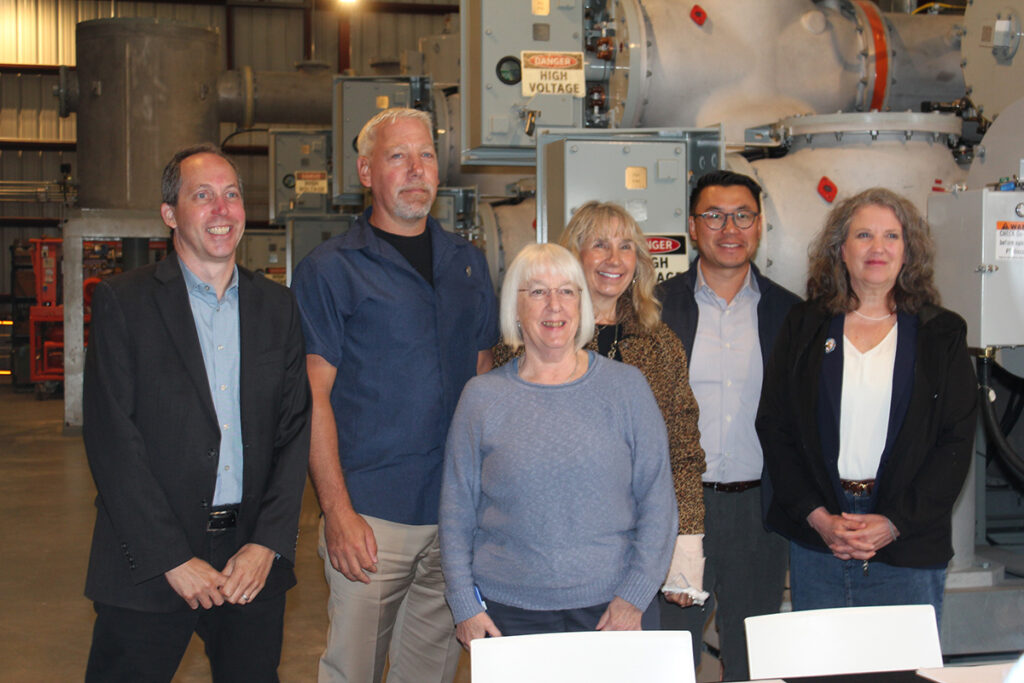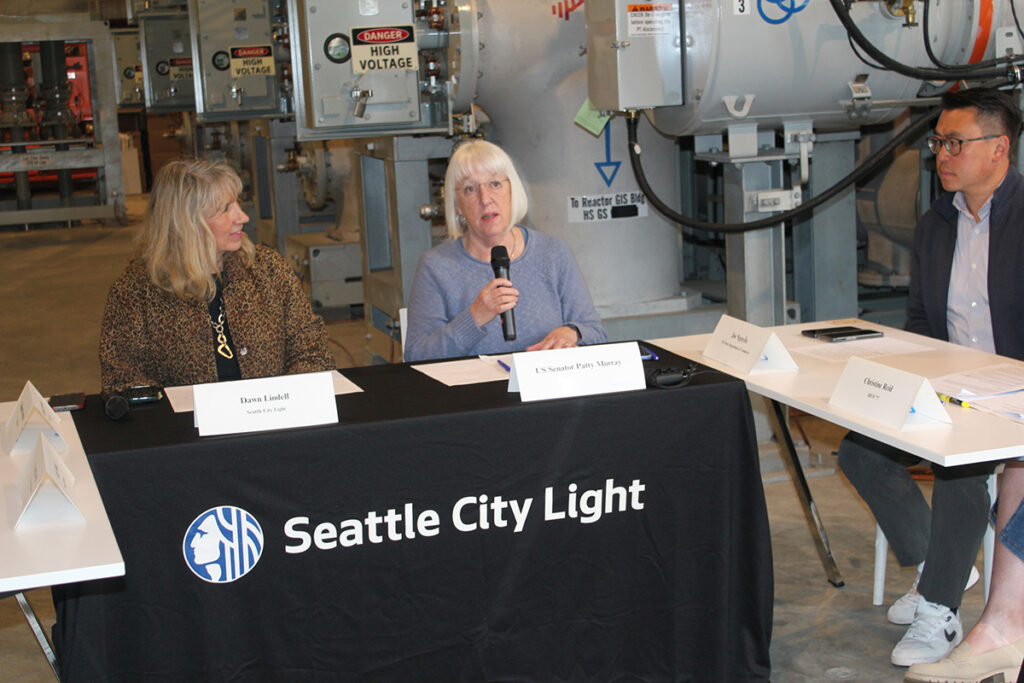By James Tabafunda
NORTHWEST ASIAN WEEKLY
President Trump may be celebrating the passage of his “One Big Beautiful Bill Act,” but in Washington state, alarm bells are ringing. In a high-stakes meeting at Seattle City Light’s Denny Substation on July 25, Sen. Patty Murray didn’t hold back. Calling the newly passed federal spending law “devastating,” she and a panel of Washington energy leaders warned that billions in clean energy investments—and tens of thousands of local jobs—are on the chopping block after Congress repealed key climate tax credits in what she dubbed the “big ugly bill.”
“I want to do this today so we can all understand, see what’s going on, and help raise voices to fight back,” she said.

(From left): Climate Solutions Executive Director Gregg Small, Western Solar General Manager Brandon Provalenko, Sen. Patty Murray, Seattle City Light CEO Dawn Lindell, Washington State Commerce Director Joe Nguyễn, and International Brotherhood of Electrical Workers Local 77 Political Director Christine Reid. (Photo by James Tabafunda)
The discussion was attended by Washington State Commerce Director Joe Nguyễn, Seattle City Light CEO Dawn Lindell, International Brotherhood of Electrical Workers Local 77 Political Director Christine Reid, Climate Solutions Executive Director Gregg Small, and Western Solar General Manager Brandon Provalenko.
“A terrible step backward”
Murray, vice chair of the Senate Appropriations Committee, opened the morning forum with a candid assessment about the new law.
“It is going to increase the cost of health care, energy, and set us back in our fight against climate change,” she said. “Before this bill, the typical Washington household could save anywhere from $390 to $900 on their annual energy bill because of clean-energy tax credits. Those are gone. So energy prices for families are going to go up.”
Independent projections confirm the Trump administration’s rollback will likely raise electricity costs for Washington state households by $115 per year by 2029, on top of broader, inflationary pressures. Puget Sound Solar has warned that without the residential rooftop solar tax credit, the local solar install market could shrink by as much as 60%.
Murray also called out the joint effort by the Department of Energy and the Trump administration to reroute funds away from solar and wind, signaling a new pathway to favor fossil fuel projects. Legal experts warn this could be in violation of Congressionally authorized budget bills and is expected to initiate lawsuits.

(From left): Seattle City Light CEO Dawn Lindell, Sen. Patty Murray, and Washington State Commerce Director Joe Nguyễn. (Photo by James Tabafunda)
A sudden policy shift
The session followed Congress’ July 4 approval of the One Big Beautiful Bill Act, signed into law by Trump. The new law rolls back key parts of the 2022 Inflation Reduction Act (IRA), especially the clean energy tax credits that experts say helped attract nearly $1 billion in private investment to Washington state. That funding had put Washington on the leading edge of the country’s clean energy transition.
Now, many of those incentives are being phased out or scrapped entirely. For example, solar and wind projects won’t be eligible for the popular Section 48E and 45Y tax credits if construction hasn’t started by July 2026. And for homeowners? Credits for rooftop solar panels and home energy upgrades are being cut off even sooner—by the end of 2025.
Republicans have pushed hard for this rollback. In a letter signed by 38 GOP House members, they argued that the IRA’s energy subsidies were hurting taxpayers, driving up energy prices, and putting the power grid at risk. “These subsidies prop up unreliable energy sources,” the letter said, “while displacing dependable, proven energy like coal and natural gas.”
But back in Washington state, officials are sounding the alarm. According to a recent state report, $8.7 billion in clean energy investments across 27 projects could now be in jeopardy. That also puts around 21,800 jobs at risk by 2030. Grid experts warn that this sudden change could freeze solar and wind development, just as demand for electricity—from EVs, a growing population, and massive data centers—is soaring.
Real-world impacts: “Jobs and innovation on the line”
Nguyễn pointed out that impacts are already being felt, particularly in economically vulnerable and rural communities. “We are seeing projects get frozen, we’re seeing jobs get lost,” he said.
“I’ve already gone around Washington state talking to local communities, talking to economic development groups, and the first thing they’ll say is we need more housing and we need more energy. So when you don’t have enough energy to create enough supply for manufacturing, to create enough supply for housing, you lose these jobs and you lose these resources. So this has a multiplier effect that impacts us in Washington state and ironically, it happens generally in rural communities that probably need this help the most.”
Nguyễn said, “The people who aren’t able to be at this table, the people who aren’t able to raise their voices, those are the ones that are going to be most impacted by these terrible, terrible policies that happen at the federal level right now. And it’s going to impact our jobs. It’s going to make your electricity more expensive. And candidly, it could make us more at risk for brownouts or blackouts with our infrastructure being weakened as well.”
Lindell explained that the utility must double its energy supply in the next nine years to keep pace with demand.
“The clean energy tax credits in the IRA were integral for us and our customers. With their elimination, we’re losing 30% of the capital cost leverage for new resources— – every new megawatt will cost more,” she said, projecting a 10-20% hike in procurement costs that will be passed on to customers through rate increases.
Reid outlined the ripple effect on the skilled labor supply.
“Apprenticeships are the backbone of building our workforce. When projects are canceled, so are training and job opportunities. Our members in Seattle alone are seeing layoffs and projects halted. This doesn’t just affect jobs today, it slows the innovation and system reliability our state depends on.”
Provalenko said Bellingham-based Western Solar just hired two more crew members last week and has not laid off anyone. He expects Western Solar will be one of the solar survivors.
“We have a robust company with commercial and residential solar and storage installations as well as a service department. Smaller companies that don’t have the credit or cash flow, along with debt, will not survive,” he said.
A surge in demand intersects with policy uncertainty
Clean energy and grid specialists say the timing couldn’t be worse. Small said that nationwide, 93% of new grid power additions in 2024 were solar, wind, or battery storage. Citing Energy Innovation, he warned,: “The impact of this bill could decrease electric capacity by 18GW in Washington— – equivalent to two times Seattle’s energy demand. Increased demand and cutbacks in supply mean higher prices, greater blackout risk, and slower job growth.”
Seattle City Light, which reports that it has been greenhouse gas neutral since 2005, is striving for carbon neutrality by 2030 and 100% renewable power by 2045, per the Clean Energy Transformation Act.
“Now is not the time to put our head in the sand. We are already behind in addressing the Earth’s warming and the impact on our communities,” Lindell said.
Divisions remain in Congress as litigation nears
While the Trump administration insists the new law restores “market discipline” by restricting subsidies for “unreliable” green energy and prioritizes energy security, state officials and Democratic lawmakers are preparing for both legal and legislative challenges. Murray repeatedly urged state and local stakeholders to keep “fighting back” and educating the public and Congress on the real-world stakes.
“Everything in Congress can be undone by a vote. But it’s an uphill fight,” she acknowledged, calling for renewed public engagement and bipartisan efforts to restore lost clean energy tax credits.
Nguyễn also said that support for clean energy persists even among some Republicans, with several signing letters backing affected technologies despite their party’s votes. “Washington has always led on aggressive decarbonization. Our challenge now is to not just survive, but to show what strategic leadership looks like going forward.”
Unknown future for Washington’s clean economy
Roundtable participants left the discussion with a warning: Uunless Congress acts immediately, Washington stands to lose billions in clean energy investments, with ripple effects statewide—for utility rates, job opportunities, energy reliability, innovation, and the climate.
Murray closed with a call to action: “Our prices are going to go up; speak out. We’re going to keep working hard, but people need to know what’s happening. There’s a lot of work ahead. We can’t give up on this.”
